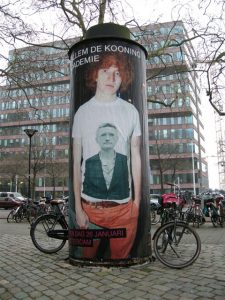BIO
Jan van Heemst, here featuring on a student’s t-shirt, is Senior Research Lecturer at the Willem de Kooning Academy, Rotterdam University of Applied Sciences. He completed his PhD in the Humanities, University of Amsterdam. His research centres on Cultural Analysis. What drives him in particular is an analytical interest in the resilience of cultural belongings in our plainly not so post-identitarian twenty-first century world. He is presently addressing the most hotly debated issues of cultural belongings in an exploration of historical configurations and actual representations that make for what appear to be collective commitments to often highly contested causes like class, race, nationality, nativity, ethnicity, gender, or, for that matter, religion. Findings will be set forth in a critical manual for advanced BA-students. They will offer major cases for ‘teachable moments’ in higher vocational and/or academic education, i.e. issues that are indisputable relevant for next decade curricula, as they appertain to sensitive topics such as migration, diaspora, tolerance, selfhood, rights, agency, and diversity. Recently Jan van Heemst published a concise History of European Culture (Dutch, Rotterdam, Ad. Donker Publishers, 2012).
